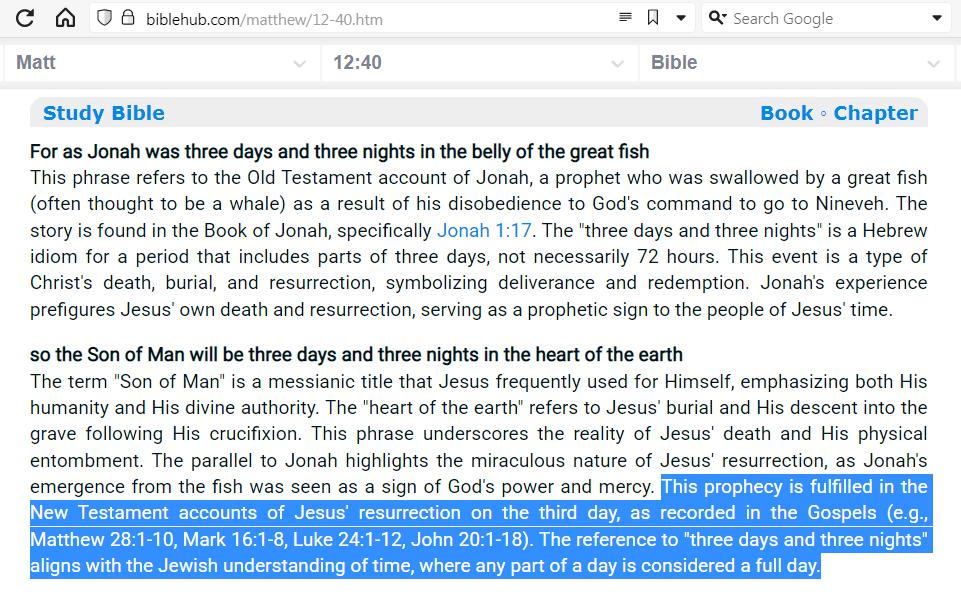Lord Jesus Christ Crucified At The Preparation Day Of Weekly Sabbath and Preparation Day Of Passover.
Luke 22:1--23:56; Mark 14:1--15:47; John 19:14; John 19:41--20:2;
G3904. paraskeué: Preparation - https://biblehub.com/greek/3904.htm
G4521. sabbaton: Sabbath - https://biblehub.com/greek/4521.htm
G1785. entolé: Commandment, order, instruction - https://biblehub.com/greek/1785.htm
-
Luke 23:50--24:3 (NET)
Jesus’ Burial
23:50 Now there was a man named Joseph who was a member of the council, a good and righteous man.
23:51 (He had not consented to their plan and action.) He was from the Judean town of Arimathea, and was looking forward to the kingdom of God.
23:52 He went to Pilate and asked for the body of Jesus.
23:53 Then he took it down, wrapped it in a linen cloth, and placed it in a tomb cut out of the rock, where no one had yet been buried.
23:54 It was the day of preparation G3904 and the Sabbath G4521 was beginning.
23:55 The women who had accompanied Jesus from Galilee followed, and they saw the tomb and how his body was laid in it.
23:56 Then they returned and prepared aromatic spices and perfumes. On the Sabbath G4521 they rested according to the commandment G1785.
-
John 19:41--20:2 (NET)
19:41 Now at the place where Jesus was crucified there was a garden, and in the garden was a new tomb where no one had yet been buried.
19:42 And so, because it was the Jewish day of preparation G3904 and the tomb was nearby, they placed Jesus’ body there.
The Resurrection
20:1 Now very early on the first day of the week, while it was still dark, Mary Magdalene came to the tomb and saw that the stone had been moved away from the entrance.
20:2 So she went running to Simon Peter and the other disciple whom Jesus loved and told them, “They have taken the Lord from the tomb, and we don’t know where they have put him!”
-


G3904. paraskeué: Preparation
Original Word: παρασκευή
Part of Speech: Noun, Feminine
Transliteration: paraskeué
Pronunciation: pah-rah-ske-VEH
Phonetic Spelling: (par-ask-yoo-ay')
Definition: Preparation
Meaning: the day of preparation, the day before the Sabbath, Friday.
Word Origin: From the Greek verb παρασκευάζω (paraskeuazo), meaning "to prepare" or "to make ready."
Corresponding Greek / Hebrew Entries: The concept of preparation for the Sabbath is rooted in the Hebrew tradition, though there is no direct Hebrew equivalent for "paraskeué." However, the practice is related to the observance of the Sabbath as outlined in passages like Exodus 16:5 and Exodus 20:8-11.
Usage: The term "paraskeué" is primarily used in the New Testament to refer to the day of preparation before the Sabbath, particularly the day before the Jewish Sabbath (Friday). It is a time when Jews would prepare for the Sabbath, ensuring that all work was completed and meals were prepared in advance, as no work was permitted on the Sabbath itself.
Cultural and Historical Background: In Jewish tradition, the Sabbath is a day of rest and worship, observed from Friday evening to Saturday evening. The day of preparation, therefore, was crucial for observant Jews to ensure that they adhered to the Sabbath laws. This day involved various activities such as cooking, cleaning, and other necessary tasks to avoid any form of work during the Sabbath. The concept of preparation underscores the importance of the Sabbath in Jewish life and the meticulous care taken to honor it.
https://biblehub.com/greek/3904.htm
-
G4521. sabbaton: Sabbath
Original Word: σάββατον
Part of Speech: Noun, Neuter
Transliteration: sabbaton
Pronunciation: SAB-ba-ton
Phonetic Spelling: (sab'-bat-on)
Definition: Sabbath
Meaning: the Sabbath, a week.
Word Origin: Derived from the Hebrew word שַׁבָּת (shabbat), meaning "rest" or "cessation."
Corresponding Greek / Hebrew Entries: - H7676: שַׁבָּת (shabbat) - Sabbath, rest
- H7677: שַׁבָּתוֹן (shabbaton) - a special Sabbath observance
Usage: The term "sabbaton" refers to the Sabbath, a day of rest observed by the Jewish people on the seventh day of the week, as commanded by God. In the New Testament, "sabbaton" is used to denote both the weekly Sabbath and, by extension, a period of rest or cessation from work. It is a day set apart for worship and reflection, commemorating God's rest after creation.
Cultural and Historical Background: The Sabbath is rooted in the creation narrative found in Genesis 2:2-3, where God rested on the seventh day. It was later codified in the Ten Commandments (Exodus 20:8-11) as a covenant sign between God and Israel. In Jewish tradition, the Sabbath begins at sunset on Friday and ends at sunset on Saturday. It is a day marked by rest from labor, worship, and family gatherings. In the New Testament era, the early Christians, many of whom were Jewish, continued to observe the Sabbath, while also gathering on the first day of the week to celebrate the resurrection of Jesus.
https://biblehub.com/greek/4521.htm
-
G1785. entolé: Commandment, order, instruction
Original Word: ἐντολή
Part of Speech: Noun, Feminine
Transliteration: entolé
Pronunciation: en-tol-AY
Phonetic Spelling: (en-tol-ay')
Definition: Commandment, order, instruction
Meaning: an ordinance, injunction, command, law.
Word Origin: Derived from the Greek verb ἐντέλλομαι (entellomai), meaning "to command" or "to order."
Corresponding Greek / Hebrew Entries: - H4687 (מִצְוָה, mitzvah): Commandment, law, ordinance
- H1697 (דָּבָר, dabar): Word, matter, thing, command
Usage: In the New Testament, "entolé" refers to a commandment or directive, often of divine origin. It is used to describe the commandments given by God, particularly those that are moral or ethical in nature. The term emphasizes the authority and obligation inherent in the command.
Cultural and Historical Background: In the Jewish tradition, commandments (mitzvot) were central to religious life, encompassing both moral laws and ceremonial practices. The Greek term "entolé" captures this sense of divine instruction, reflecting the Jewish understanding of living in obedience to God's will. In the Greco-Roman world, the concept of a command was also familiar, often associated with military or civic orders, but the biblical usage elevates it to a divine mandate.
https://biblehub.com/greek/1785.htm
-
Last Updated on 2025-09-14 by assa
